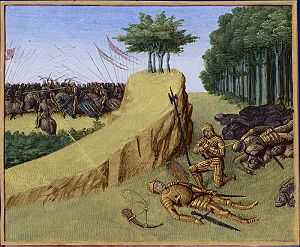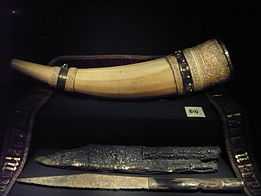778
This article is about the year 778. For the number, see 778 (number). For other uses, see 778 (disambiguation).
| Millennium: | 1st millennium |
|---|---|
| Centuries: | 7th century – 8th century – 9th century |
| Decades: | 740s 750s 760s – 770s – 780s 790s 800s |
| Years: | 775 776 777 – 778 – 779 780 781 |
| 778 by topic | |
| Politics | |
| State leaders – Sovereign states | |
| Birth and death categories | |
| Births – Deaths | |
| Establishment and disestablishment categories | |
| Establishments – Disestablishments | |
| Gregorian calendar | 778 DCCLXXVIII |
| Ab urbe condita | 1531 |
| Armenian calendar | 227 ԹՎ ՄԻԷ |
| Assyrian calendar | 5528 |
| Bengali calendar | 185 |
| Berber calendar | 1728 |
| Buddhist calendar | 1322 |
| Burmese calendar | 140 |
| Byzantine calendar | 6286–6287 |
| Chinese calendar | 丁巳年 (Fire Snake) 3474 or 3414 — to — 戊午年 (Earth Horse) 3475 or 3415 |
| Coptic calendar | 494–495 |
| Discordian calendar | 1944 |
| Ethiopian calendar | 770–771 |
| Hebrew calendar | 4538–4539 |
| Hindu calendars | |
| - Vikram Samvat | 834–835 |
| - Shaka Samvat | 700–701 |
| - Kali Yuga | 3879–3880 |
| Holocene calendar | 10778 |
| Iranian calendar | 156–157 |
| Islamic calendar | 161–162 |
| Japanese calendar | Hōki 9 (宝亀9年) |
| Julian calendar | 778 DCCLXXVIII |
| Korean calendar | 3111 |
| Minguo calendar | 1134 before ROC 民前1134年 |
| Seleucid era | 1089/1090 AG |
| Thai solar calendar | 1320–1321 |
| Wikimedia Commons has media related to 778. |

The death of Roland (Battle of Roncevaux)

Year 778 (DCCLXXVIII) was a common year starting on Thursday (link will display the full calendar) of the Julian calendar. The denomination 778 for this year has been used since the early medieval period, when the Anno Domini calendar era became the prevalent method in Europe for naming years.
Events
By place
Byzantine Empire
- Arab–Byzantine War: Emperor Leo IV ("the Khazar") repulses an Abbasid invasion in Anatolia. A Byzantine expeditionary force under Michael Lachanodrakon, military governor (strategos) of the Thracesian Theme, defeats the Muslim-Arabs at the fortress city of Germanikeia in Cilicia (modern Turkey). He plunders the region and takes many captives, mostly Jacobites, who are resettled in Thrace.[1]
Europe
- A Frankish army (supported by Burgundians, Bavarians, Bretons, Lombards, and Visigoths) under king Charlemagne invades Al-Andalus (modern Spain) but is halted at Zaragoza in the thughur or frontier zone of the Emirate of Córdoba. During the retreat, Charlemagne is defeated by the Basques at Roncevaux (Pyrenees). Among those killed is Roland, governor of the Breton March, this give rise to the 11th-century epic Song of Roland. Beginning of medieval French literature.
- Saxon Wars: Widukind and his close followers returns to Saxony from Denmark. He probably makes alliances with the Danes and the north-western Slav tribes. Saxon 'rebels' destroy the fortress of Karlsburg and sack Deutz (near Cologne) but are unable to cross the Rhine. They are driven back by the garrison of Koblenz, but then ambush and defeat the Frankish pursuers. Counter-attacking Frankish forces pursue the Saxons up the Lahn Valley and defeat them near Leisa.[2]
Britain
- Unrest in Northumbria leads to king Æthelred I ordering the execution of three of his dukes. This considerably weakens his position (approximate date).
By topic
Religion
- Saxon raiders destroy many churches deep in Frankish territory. The Benedictine monks of Fulda Abbey (modern-day Hesse) hurriedly carry the relics of Saint Boniface over the Rhön Mountains to safety.[3]
Births
- Ali ibn al-Madini, Muslim scholar (d. 849)
- Bernard, bishop of Vienne (d. 842)
- Ermengarde of Hesbaye, queen of the Franks (d. 818)
- Li Gongzuo, Chinese writer (d. 848)
- Li Shigu, general of the Tang Dynasty (d. 806)
- Liu Gongquan, Chinese calligrapher (d. 865)
- Louis the Pious, king of the Franks (d. 840)
- Rotrude, daughter of Charlemagne (or 775)
- Xian Zong, emperor of the Tang Dynasty (d. 820)
- Zhaozhou, Chinese Buddhist monk (d. 897)
Deaths
- Áed Find, king of Dál Riata (Scotland)
- Alpín II, king of the Picts
- Berhthun, bishop of Lichfield (approximate date)
- Eterscél mac Áeda, king of the Uí Cheinnselaig (Ireland)
- Mac Flaithniadh, abbot of Clonfert (Ireland)
- Niall Frossach, High King of Ireland
- Sufyan al-Thawri, Muslim scholar and jurist (b. 716)
- August 15 – Roland, Frankish military leader
References
- ↑ Treadgold 1997, p. 369
- ↑ David Nicolle (2014). The Conquest of Saxony AD 782–785, p. 12. ISBN 978-1-78200-825-5
- ↑ David Nicolle (2014). The Conquest of Saxony AD 782–785, p. 17. ISBN 978-1-78200-825-5